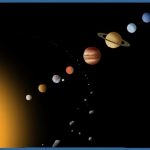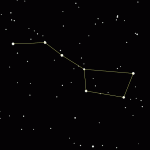Starry-eyed Surprise Posted by Katarzyna on Aug 11, 2010 in Vocabulary
I was listening to one of my favorite songs the other night with the boys. The song is “Starry-eyed Surprise” and it’s by Paul Oakenfold. Well, after a little dancing in their car seats, my boys wanted to lay out and look at some stars. So when we got home, we grabbed a blanket, my trusty Droid loaded with Google Sky Map and headed to the open field behind our house. Little did I know that I was about to get a Polish lesson of my own.
My oldest exclaimed right away, “Mom, I see a lot of gwiazdas.” Seeing my opportunity, I replied, “Mama, widzę dużo gwiazd.” “Yeah, right, that’s what I said.” LOL. So far, so good. I did finally get him to repeat it, and it was a lot easier breaking out vocabulary words to get him going. For example, star is gwiazda.
Unfortunately, we did not have much of a księżyc (moon) to go off of, as it was in półksiężyc (crescent) phase, and very thin at that. So I was left to find constellations. I have never been great at recognizing them, and to get the Polish name for them was really putting me to the challenge. It’s a good thing Mamusia is only a phone call away.
 While I loaded Google Sky Map, I did go over the planets of the Układ Słoneczny (Solar System) with my boys. We started with the closest to the słońce (sun), the planeta (planet) Merkury (Mercury). The sky map showed us where Merkury was, however, it was too far too see with the naked eye. Next we practiced Wenus (Venus) and my oldest did well recognizing the pronunciation difference from English to Polish (Veh-noos vs Vee-nuhs). Ziemia (Earth) was a little strange for him because it is the same as ground. Mars and Saturn are spelled the same for both with just a slight pronunciation difference. Of course we know Saturn is famous for its many pierścienie (rings), and for my little Polish linguists, they made the easy relation to the same thing that Mom wears on her fingers. Jupiter is Jowisz, and Uran (Uranus), Neptun (Neptune) and Pluton (Pluto) follow after Saturn. Interestingly enough, Pluton sparked a conversation as to why it was considered a planeta when I was young but is coming into question in recent years. We never reached a conclusion.
While I loaded Google Sky Map, I did go over the planets of the Układ Słoneczny (Solar System) with my boys. We started with the closest to the słońce (sun), the planeta (planet) Merkury (Mercury). The sky map showed us where Merkury was, however, it was too far too see with the naked eye. Next we practiced Wenus (Venus) and my oldest did well recognizing the pronunciation difference from English to Polish (Veh-noos vs Vee-nuhs). Ziemia (Earth) was a little strange for him because it is the same as ground. Mars and Saturn are spelled the same for both with just a slight pronunciation difference. Of course we know Saturn is famous for its many pierścienie (rings), and for my little Polish linguists, they made the easy relation to the same thing that Mom wears on her fingers. Jupiter is Jowisz, and Uran (Uranus), Neptun (Neptune) and Pluton (Pluto) follow after Saturn. Interestingly enough, Pluton sparked a conversation as to why it was considered a planeta when I was young but is coming into question in recent years. We never reached a conclusion.
 Going over the planets seemed to get me off the hook for identifying konstelacje (constellations), or so I thought. So I went with what I knew and found Polaris or Tramontana (the North Star) and was able to identify and show them Mała Niedźwiedzica (Little Dipper or Ursa Minor). Surprisingly, I was able to identify Wielki Wóz (Big Dipper) as well. I tried to find Rak (Cancer), but would have faster found a needle in a haystack. That konstelacja does NOT look like a rak (crab)!
Going over the planets seemed to get me off the hook for identifying konstelacje (constellations), or so I thought. So I went with what I knew and found Polaris or Tramontana (the North Star) and was able to identify and show them Mała Niedźwiedzica (Little Dipper or Ursa Minor). Surprisingly, I was able to identify Wielki Wóz (Big Dipper) as well. I tried to find Rak (Cancer), but would have faster found a needle in a haystack. That konstelacja does NOT look like a rak (crab)!
So, in light of our outdoor adventures, I decided to find something the boys and I could share that would continue to help them learn their Polish words. I came across a very cute animated movie, Gwiazda Kopernika (Copernicus’ Star). I ordered it from a Polish DVD site and hope to have it soon! I promise to follow-up with a nice review! Here’s the trailer to spark your interest:
Do następnego czytania…

Build vocabulary, practice pronunciation, and more with Transparent Language Online. Available anytime, anywhere, on any device.



